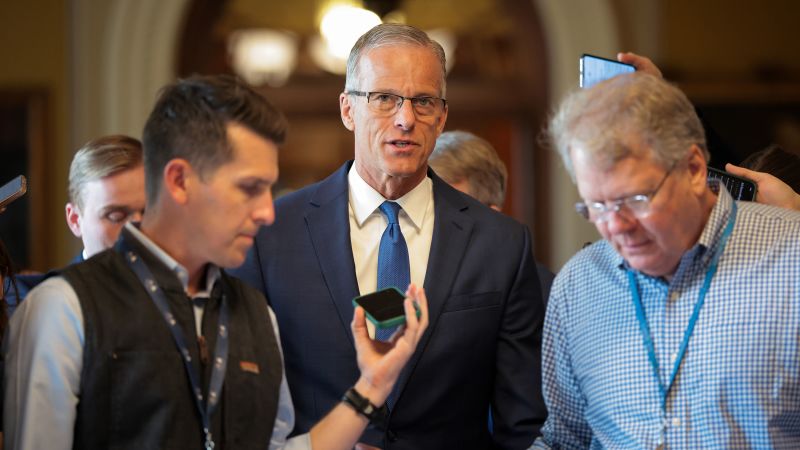On a pivotal Monday, President Donald Trump engaged in discussions with several GOP senators as momentum builds around his intricate domestic policy bill. These discussions come at a time when the Senate is preparing to refine the legislation, with congressional leaders expressing a robust desire to deliver the finalized package to Trump’s desk ahead of the July 4 holiday. The timeline reflects the urgency behind the legislative efforts, as lawmakers recognize the tight schedule leading up to the anticipated holiday recess.
However, the path is strewn with challenges. Numerous Republican senators have expressed reservations regarding the package passed by the House, raising concerns about amendments that may prove difficult for Speaker Mike Johnson’s slim majority to endorse. Given the narrow margin, these apprehensions must be addressed promptly to ensure party unity and legislative success. Senators know that any changes made must be palatable to all members to avoid further complications down the line.
During the pivotal meeting, Trump conferred with Senate Majority Leader John Thune at the White House. Thune remarked that they discussed significant aspects of the bill, suggesting that their conversation spanned several critical components aimed at garnering broader GOP support. Acknowledging potential dissent, several senators prominent in voicing their opinions, including Sen. Josh Hawley of Missouri, Sen. Ron Johnson of Wisconsin, and Sen. Rand Paul of Kentucky, attested to their communications with the president regarding the legislation.
Rand Paul specifically indicated that his support hinged on the removal of any debt ceiling increases from the legislative package. He emphasized that coupling a debt ceiling increase with the bill was not a conservative approach and articulated that separating these issues could make the bill more acceptable. This indicates the significant ideological divide within the party on fiscal policy, underscoring the need for careful negotiation to accommodate various viewpoints.
Sensing a substantial level of discord, Johnson conveyed that he too sought further commitments from Trump regarding spending cuts. His remarks reflected a nuanced understanding of the delicate compromise needed to secure his support for the bill. He appeared open to discussing assurances of future spending cuts outside of the legislation as an alternative avenue to reconcile his concerns.
Adding to the discussions, Trump issued a rallying call to Senate Republicans through his social media platform, Truth Social. He urged them to expedite the legislative process and ensure that the bill reached his desk prior to Independence Day, a clear signal of his emphasis on meeting political deadlines.
Hawley, who articulated concerns over Medicaid adjustments, shared that Trump reasserted that there would be no cuts to Medicaid benefits, which resonates with the broader anxiety among senators about how the bill could disrupt healthcare access, particularly for low-income populations. This thematic concern is reiterated by multiple GOP senators who grapple with understanding the ramifications of proposed reforms.
Several senators are also worried about the potential impacts of taxes on medical providers and their implications for rural healthcare facilities in their states. The sentiment shared among them points to apprehensions that the reforms might inadvertently deter medical services or lead to facility closures, further complicating the healthcare landscape.
Amidst these discussions, the matter of Biden-era clean energy tax credits loomed. Some senators indicated resistance to rolling back these credits, hinting at the significant pushback from constituents who have invested in clean energy initiatives. Their stance reflects a broader trend among Republicans who are carefully weighing the business implications of such policy changes while pondering the balance between fiscal responsibility and innovation support.
Senator Markwayne Mullin contributed to the discussions, asserting that while modifications to the bill may be necessary, the foundational structure established by House Republicans is strong and should not be dismantled. His perspective aligns with the urgency expressed by other senators to handle the negotiations adeptly while ensuring their constituents’ interests are preserved.
As the political landscape continues to evolve, GOP lawmakers, including John Cornyn and Thom Tillis, have acknowledged the accelerated timeline required to move the bill through the legislative process. With the impending debt ceiling deadline, they appear willing to adopt a measured approach that preserves their negotiating advantages while seeking to finalize a bill that reflects their collective priorities.
In conclusion, this intricate legislative endeavor signals a defining moment in current domestic policy discussions within the GOP. With key players losely aligned and actively engaged in workgroup discussions, the outcome of these negotiations will be pivotal for the party’s legislative agenda, especially as political pressures mount with the Fourth of July rapidly approaching. The stakes are clear; it remains to be seen how effectively GOP leaders can reconcile their diverse opinions and unite around a coherent strategy that addresses both fiscal responsibility and the needs of their constituents.



